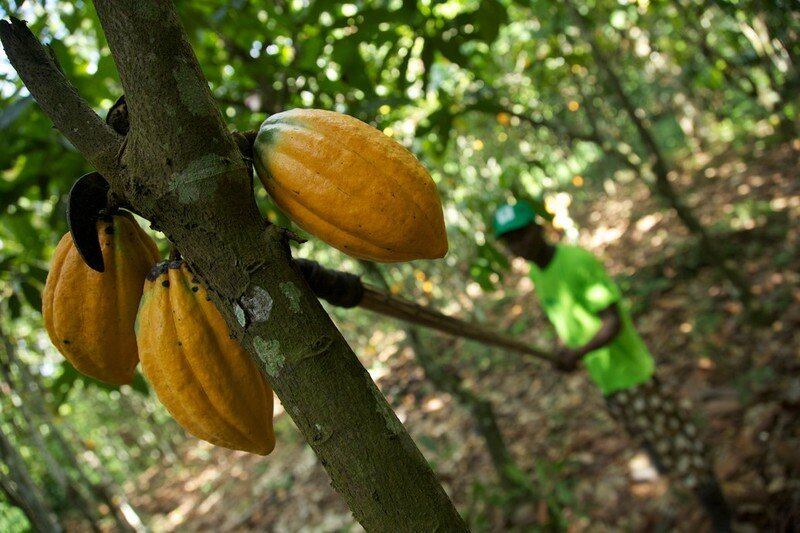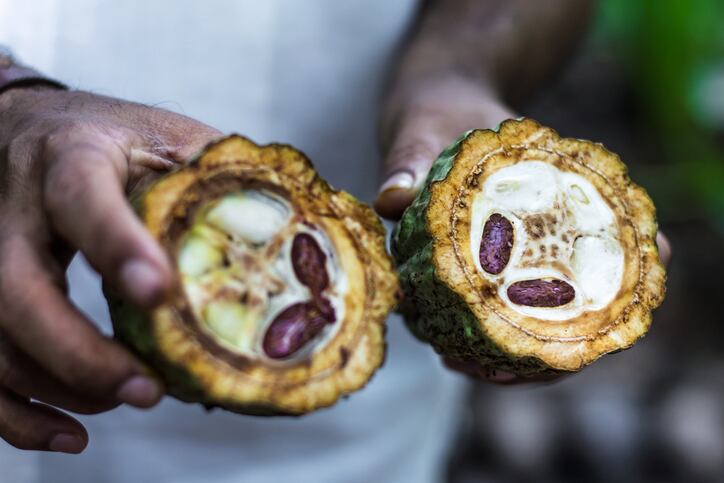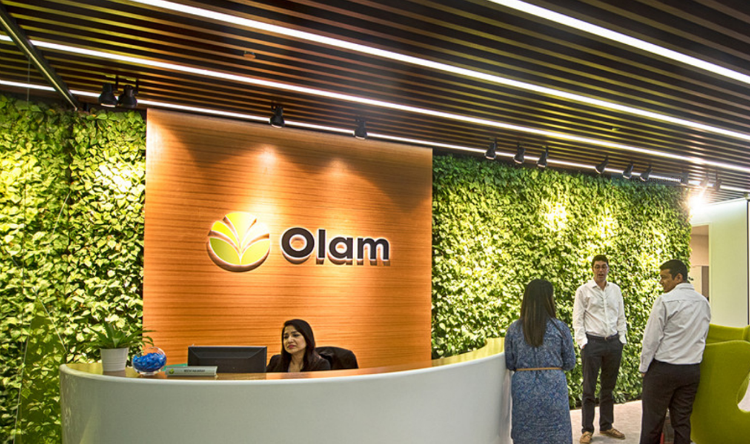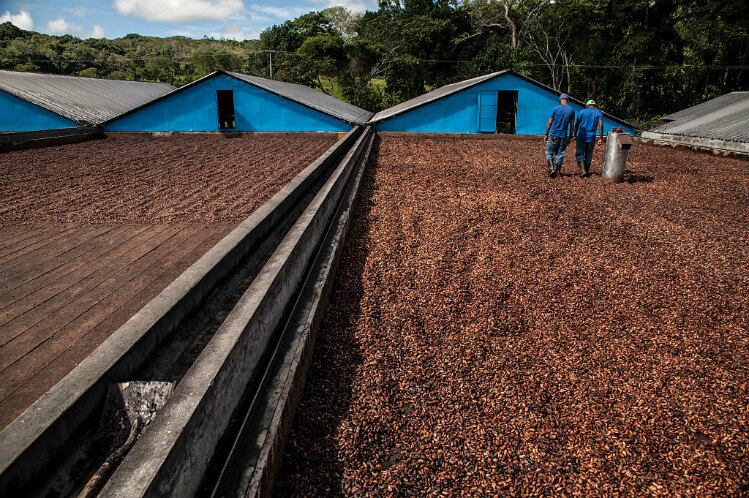Olam Cocoa has set out a number of set concrete goals for 2030 across the company’s global, direct cocoa supply chain that will address living incomes for farmers, child labor, education, deforestation and the environment.
Under its new Cocoa Compass initiative, target areas for action come under three pillars: Focused on Farmers, Empowered to Grow and Investing in Nature.
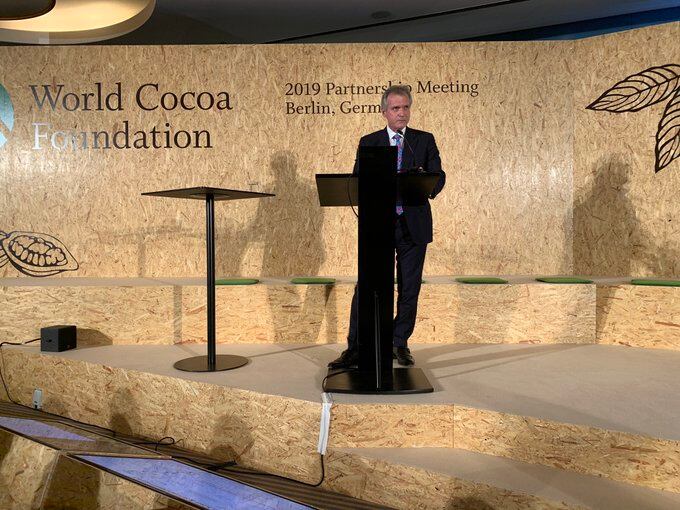
The announcement was made at this year’s World Cocoa Foundation Partnership Meeting in Berlin, where Gerard Manley, managing director & CEO of Olam Cocoa, said: “For over a decade with our customers and partners, we have been present on the ground, supporting cocoa communities around the world to improve their livelihoods and protect forests, while also providing a stable route to market for farmers through in-country cocoa processing.
“With our living income goal, we are focusing our efforts on supporting the farmers we believe can be the backbone of a sustainable cocoa supply chain, while continuing to provide holistic support to all cocoa farmers in our sustainability programs. We know there is still more to do which is why we are challenging ourselves, and the industry, to have an even greater positive impact on the future of cocoa.”
We don't believe that certification on its own provides sustainable cocoa
Although Olam Cocoa’s goals are set for 2030, Manley told delegates he hopes they can be achieved sooner. Cocoa Compass, he said, is aligned with the United Nation’s Sustainable Development Goals (SDGs) and with milestones for action in 2020 and 2024.
He said that any legislation from the EU has to be implemented in a sensible way. “We don't believe that certification on its own provides sustainable cocoa. There are lots of other elements in our certification and verification process and in our sustainability programs, which includes things like market access for farmers, and we're aslo very conscious about quality.
“What we're hearing from the EU is that cocoa would be a good product for them to be engaged with because a very large amount of cocoa is coming into the EU from Ghana and Côte d'Ivoire and there's a very large quantity of cocoa processed in Europe, so I can understand why cocoa is looked at as being one of those supply chains, which could form the basis for other agricultural supply chains in the future.”
Living Income Differential
He backed the joint initiative by Ghana and Côte d'Ivoire for a Living Income Differential and said Cocoa Compass was designed before the plan was announced.
“We share the belief of the two countries to increase the price paid to the farmers and the value they receive from the cocoa supply chain and Olam has participated in the purchase of cocoa from Côte d'Ivoire and Ghana.”
On a similar scheme being proposed by Nigeria and Cameroon, Manley was more hesitant.
“We support what their intention is for the farmers getting a greater share of the market price, the interesting thing with Cameroon and Nigeria, and a number of other countries, is they already receive a fairly high percentage of the market price. What each country does is up to them. They have an opportunity to raise their prices, but also to market their cocoa in a very different way. Nigeria has plenty of room for growth, so has Cameroon, in the cocoa world.
"We hope they use this opportunity because we need more cocoa, but we'd like it to be grown sustainably. We run a very large business in both of those countries, and we do appreciate the situation and will listen to what they have to say.
Manley said a large part of Cocoa Compass is devoted to deforestation.“We want to mitigate our environmental footprint, both in our producing countries and also in our factories, and we have already taken significant steps to do that.”
Manley told ConfectioneryNews that Olam Cocoa’s agro-forestry policy and the planting of trees has become increasingly important. “Last year we planted 1.3 million agro-forestry trees, not a very normal thing for a cocoa company to do, so we're really on our way to develop our policy through other nurseries."
Manley said that other schemes include using cocoa shells as fuel for boliers in its factories, instead of sending the shells back as waste.
Sustainability progress
He told the WCF that Cocoa Compass builds on Olam Cocoa’s 15 years of sustainability progress, and the company has already achieved 100% traceability of its sustainable supply chain in Côte d’Ivoire and Ghana under its 2020 traceability commitment.
Olam Cocoa has already paid $136m in sustainability premiums to farmers and farming cooperatives in partnership with customers, he said.
The company has issued over 64,000 tailored Farm Development Plans to increase farmers’ productivity and incomes through the Olam and Farmers Information System, and established its own Child Labour Monitoring and Remediation Systems which cover 95,000 cocoa farmers in Côte d’Ivoire and Ghana.
Traceability
Andrew Brooks, head of cocoa sustainability, at Olam Cocoa, said in a statement: “Transparency and traceability are core to Cocoa Compass. We remain focused on leveraging social and environmental insights to refine our sustainability programs to meet the needs of farmers and their communities.
“AtSource will be the platform through which we deliver these programs in cocoa growing regions and through which we are able to better understand and report the improvements required to reach our goals. It is tailored towards achieving the objectives of both the Cocoa Compass strategy and our customer’s own sustainability goals.”
Manley said AtSource has been running for two years and “provides a baseline for our programs. We believe that using AtSource is something which will give verification of the traceability of our products, and will give an understanding of the metrics that we use. For us it's a big plus and a big move forward.”
He said the company will publish an annual Cocoa Compass Impact Report to share data collection methodology and an update on progress against its goals. Manley said it already shares its data with organizations such as the WCF.
“Olam's Cocoa Compass is going to be a phenomenal challenge for us, we know we have to do more, and make that impact at scale. I have listened to all of the speakers at the WCF meeting, and nobody is satisfied with what we have done so far,” he said.

